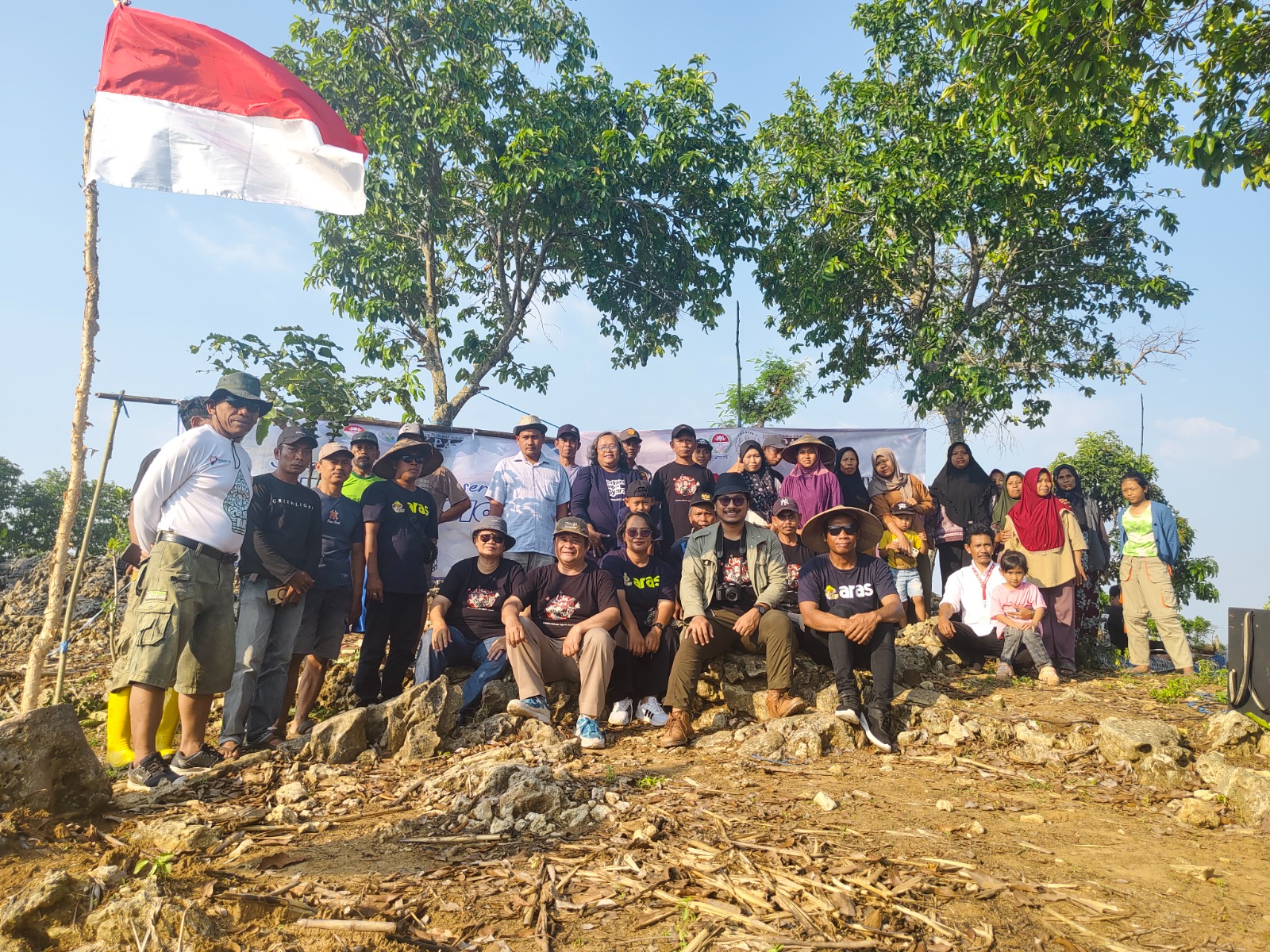That day, at 14.00 on Tuesday (23/9), a team of from Yayasan YAPHI arrived at Sucipto’s house, the chairperson of Peasant group in South Pati (KOMPAK) in Dukuh Tumpang (Hamlet), Porang-Paring Village, Pati. As planned, they were going to celebrate the National Peasant Day at a site which local peasants worked on. They call it "tanah pajangan" or the Land of Pajangan – about 500 meters from Sucipto’s house.
The site was on top of a hill. After passing a few houses, and a small cemetery complex, we found a cement footpath. It was not a broad footpath – around 70 cm or less than 1 meter. The footpath was not even reaching the top of the hill. After the cement footpath, we found ourselves in a steep, stony path. I found a stick that helped me balance my aging body. "I walked twice here every day, to work on the land," said Mrs. Sri, a female peasant who owned "tanah pajangan".
Local peasants walked the 500 meter path on a daily basis. They have worked on the land for 20 years. Together with the land they work on their own, they got excellent fruit and tuber harvest. Yet they found it difficult to sell them at the right price that their hard work deserved.
Less than an hour later, we reached a flat terrain. There was a plastic tarpaulin with food offering prepared by the peasants – including fried whole chicken and rice cone, corn rice and "side-dishes", as well as tubers and other local harvest such as banana, papaya, snakeskin fruit, and peanut.
There was a poster of Peasant Day, a portable loudspeaker, and flag waving on the site. The ceremony was about to start. After he opening about why there was a celebration for the Peasant Day, then came the Indonesian National Anthem with three – which was “new” for the peasants as they usually sang with only one stanza.
The Natonal Anthem "Indonesia Raya" had deep and touhing meaning, not just a regular national anthem but also a symbol of the national struggle and the nationalism of the Indonesian people. It was rare to hear the anthem sung in three stanza, but it happened right there with the peasants in Tumpang Hamlet, Porang Paring Village.
After the national anthem, Adi C. Kristiyanto from Yayasan YAPHI explained that the Motherland was the sacred birthplace. The lyrics asked all citizens to unite and protect the Motherland. The phrase "Marilah kita berjanji, Indonesia abadi" (Let Us Pledge, Indonesia Forever) showed commitment to help each other and to love the Motherland.
The second Stanza, Adi said, glorified Indonesia as a rich and noble land. The lyrics asked all citizens to always maintain and bring prosperity to the Motherland. The Phrase "Selamatlah rakyatnya, selamatlah putranya" (May Her People, and Her Sons/Daughters be Safe) in performing their task to keep the Motherland safe.
The third stanza asked all citizens to maintain and protect unity and sovereignty. The phrase "Bangunlah jiwanya, bangunlah badannya" (Let the body and Soul become Awake) highlighted the importance of consolidating the national character before the physical development proceeded. But now, people may have said "the spiritual first, and then the science." Or humanity first as a top priority.
In a ceremony, speeches were “mandatory.” Sucipto started by saying thank you to all. He reminded all that peasant was a critical profession. Hence, it was worth the celebration because without peasants, there would not be food sufficiency. He also asked peasants to maintain the land they worked on and to work on the land sustainably.
"In the name of God, we are in control of this Land of Pajangan. We hope that this Peasant Day celebration would further strengthen ourselves to meet the challenges ahead. We bequeath this to the young generation and therefore we must advance this group further. We will give this land to our children and grandchildren. Pajangan does not belong to the State Forestry Authority but to the people of Porang Paring," said Sucipto.
The Village Chief or known as “Pak Inggi” by the local people, Sutadi gave his appreciation to the committee for their courage to have the Peasant Day celebration at the top of Pajangan Hill. He also extended his appreciation to Yayasan Yaphi who had helped the local people for many years to defend the people vis-a-vis the Government and the State Forestry Authority.
Sutadi said that in 1999, he had unforgetable experience when as a child, his grandfather took him up the hill in their plot of land.
As Village Chief, He said that people had to fights for the land ownership in pajangan and faced the challenges of shifting regulations. He hoped that peasants would participate in his program and his accompaniment.
The director of Yayasan Yaphi, Haryati Panca Putri said that the Peasant Day on the 24 September happened at the same day as the birthmark of the Agrarian Law which remained valid to this day as a pillar for peasants in their fight for their right.
Then, it was lunch time featuring rice, corn rice, and fried whole chicken, vegetable salad, and vegetable stir-fry.
I managed to talk to Kustiningsih, a woman peasant who talked about the flow of Sungai Braholo (River) – a river who changed its name to Sungai Sumber Penguripan (Source of Livelihood) whose water feeds the pipes to people’s houses. Sungai Braholo (at the foot of a hill) was a witness to the peasant fight for the land in Pajangan which they received from their grandparents to manage and grow crops, which they could reclaim back. One thing though was that the fight would continue. (Ast)












